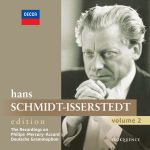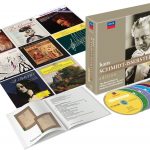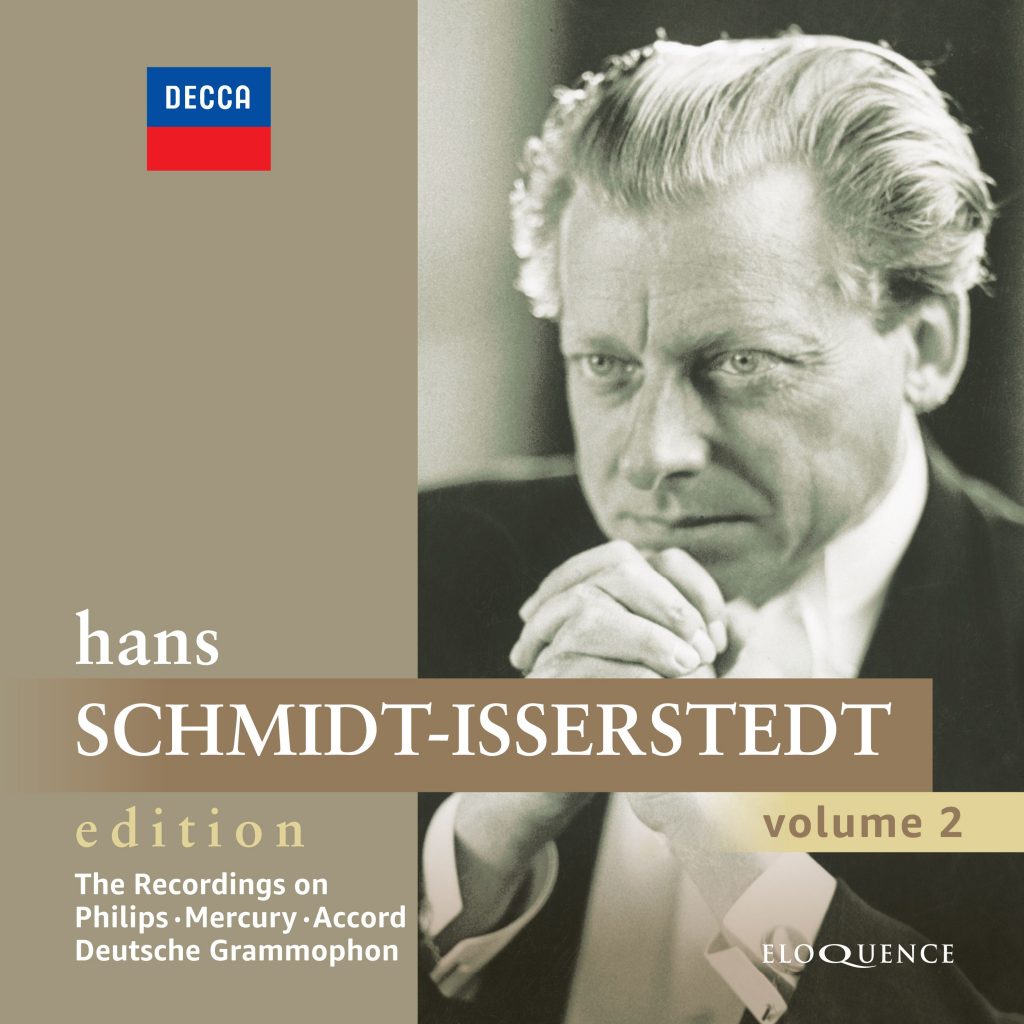
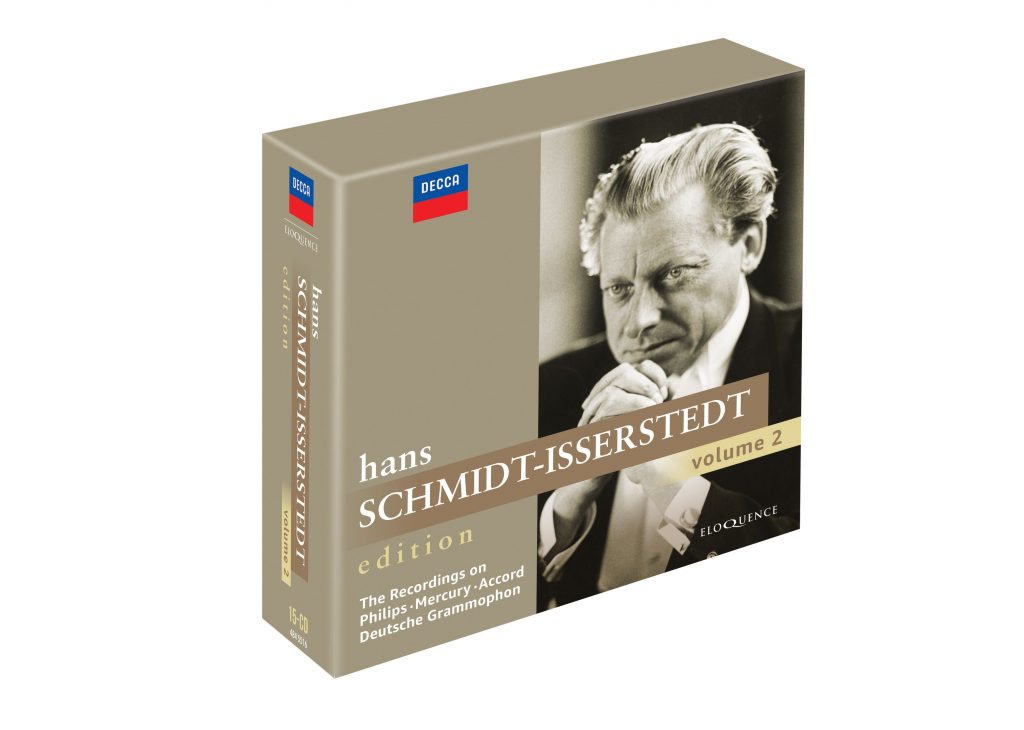
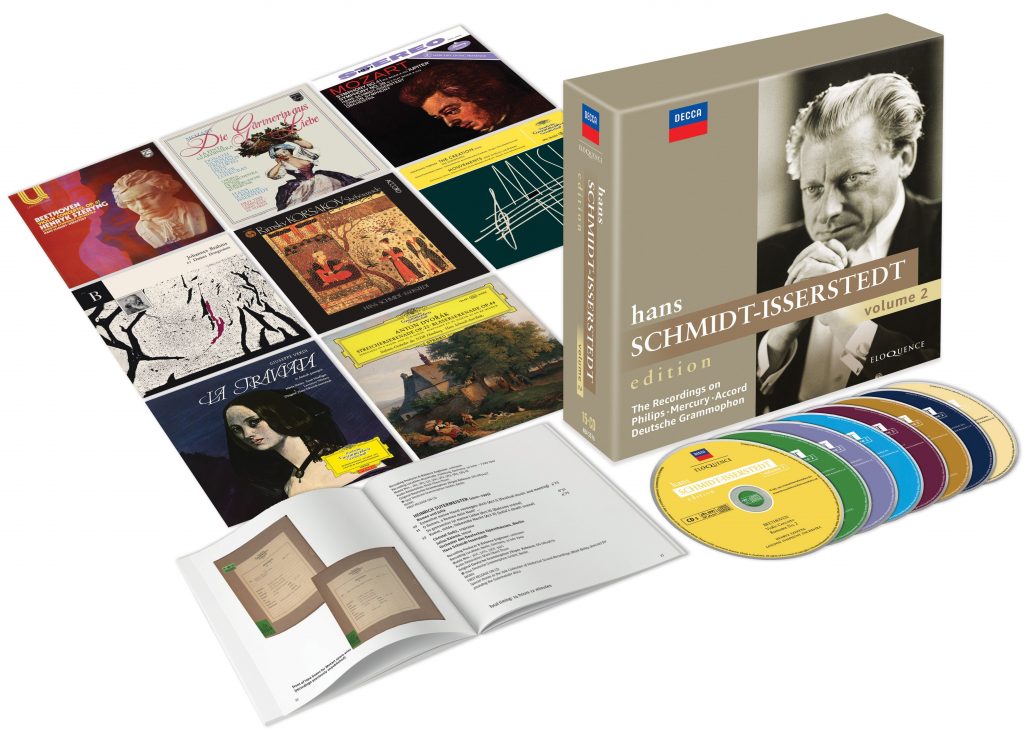
Hans Schmidt-Isserstedt became a household name for many record collectors in the 1970s thanks to the cycle of Beethoven symphonies recorded with the Vienna Philharmonic (newly reissued in a companion box-set by Eloquence). Though he had made recordings and held several significant posts in pre-war Germany, such as directorship of opera houses in Berlin and Hamburg, his career took on a new lease of life after 1945 as the founder-conductor of the Hamburg Radio Symphony Orchestra, now known as the NDR Elbphilharmonie Orchestra. Their account of Rimsky-Korsakov’s Scheherazade is dynamic and superbly prepared. The complete Hungarian Dances of Brahms is another delightful NDR/Schmidt-Isserstedt rarity revived in the set.
The celebrated Vienna Philharmonic cycle of Beethoven piano concertos with Wilhelm Backhaus demonstrated what a sympathetic accompanist Schmidt-Isserstedt was. In this set he lends equally attentive support to Monique Haas in Ravel, Alfred Brendel in Brahms (the pianist’s first recording of the First Piano Concerto), Wolfgang Schneiderhan in Mozart and Henryk Szeryng in Beethoven.
After his international profile rose with the growing reputation of the NDR orchestra, he became a welcome guest on the podiums of Europe’s great orchestras.
From 1955–64 he was chief conductor of the Royal Stockholm Philharmonic, and in 1962 recorded with them the First and Third symphonies of Berwald. He gave many first performances of new works, especially by English and German composers; Die Schöpfung by Wolfgang Fortner is a vivid seventeen-minute setting of a poem by the American poet James Weldon Johnson, a contemporary reimagining of Creation, for which Schmidt-Isserstedt and the NDR orchestra accompanied Dietrich Fischer-Dieskau.
The conductor’s first love was Mozart, and it is fitting that his last major recording project before his death from a heart attack in 1973 was another first on record, the German version (Die Gärtnerin aus Liebe) of Mozart’s early opera La finta giardiniera, for which Philips assembled an all-star cast including Jessye Norman, Hermann Prey and Tatiana Troyanos. This was greeted after his death as the perfect memorial to his unassuming art; unlike many maestros of his generation and background, he got what he wanted not through fear but respect and a spirit of collective endeavour.
Included, too, in this set are early (1940s) recordings made by the conductor of music by Mozart, Tchaikovsky and Sutermeister. This Eloquence set is issued with original covers and a new essay by Peter Quantrill on Hans Schmidt-Isserstedt and his career.
CD 1
BEETHOVEN: Violin Concerto; Violin Romance No. 2
Henryk Szeryng
London Symphony Orchestra
CD 2
BRAHMS: Piano Concerto No. 1
Alfred Brendel
Concertgebouworkest
CD 3–5
MOZART: Die Gärtnerin aus Liebe
Ileana Cotrubas; Helen Donath; Jessye Norman; Tatiana Troyanos; Werner Hollweg; Gerhard Unger; Hermann Prey
NDR-Sinfonieorchester
CD 6
MOZART: Symphonies Nos. 39 & 41
London Symphony Orchestra
CD 7
SCHUBERT: Symphonies Nos. 6 & 4
London Symphony Orchestra
Walter Süsskind (No. 4)
CD 8
BRAHMS: 21 Hungarian Dances
NDR-Sinfonieorchester
CD 9
RIMSKY-KORSAKOV: Scheherazade
NDR-Sinfonieorchester
CD 10
BERWALD: Symphonies Nos. 1 & 3
Stockholm Philharmonic Orchestra
CD 11
MOZART: Violin Concertos Nos. 4 & 5
Wolfgang Schneiderhan
Berliner Philharmoniker (No. 4)
NDR-Sinfonieorchester (No. 5)
CD 12
FORTNER: The Creation
Dietrich Fischer-Dieskau
FORTNER: Mouvements
Carl Seeman
RAVEL: Piano Concerto in G major
Monique Haas
NDR-Sinfonieorchester
CD 13
VERDI: La traviata (highlights)
Maria Stader; Ernst Haefliger; Lawrence Winters
NDR-Sinfonieorchester
FIRST RELEASE ON CD
CD 14
DVOŘÁK Serenade for Strings; Serenade for Winds
NDR-Sinfonieorchester
CD 15
HISTORICAL RECORDINGS
MOZART Symphony No. 38 ‘Prague’*
MOZART Don Giovanni, Le nozze di Figaro – arias°
Lore Hoffmann
TCHAIKOVSKY Serenade for Strings*
NDR-Sinfonieorchester
SUTERMEISTER Romeo und Julia (excerpts)*
Christel Goltz; Julius Katona
Orchester des Deutschen Opernhauses, Berlin
*FIRST RELEASE ON CD
°PREVIOUSLY UNPUBLISHED
“Schmidt-Isserstedt’s perfectly chosen tempo for the Allegro of No. 39, his crisp handling of the minuets of both symphonies, his admirably Mozartian and unhurried speed in the finale of No.39, the light, dancing forte everywhere, are all a pleasure to hear.” Gramophone, August 1959 (Mozart: Symphonies Nos. 39 & 41)
“Susskind and Schmidt-Isserstedt have similar ideas about Schubert. They play him in healthy, outgoing fashion. Both of these performances are vigorous and lively … The orchestra plays well for both conductors, and the recording is bright and well-defined.” Stereo Review, December 1959 (Schubert)
“Schmidt-Isserstedt’s readings … would be very hard indeed to beat …They have all the positive musicianly virtues without which many an unaffected reading is merely dull … [an acquisition] you would be unlikely to regret, whatever rival versions appear in the course of time.” Gramophone, August 1960 (Mozart: Symphonies Nos. 39 & 41)
“In the slow movement, Szeryng and Schmidt-Isserstedt carry on a dialogue of increasing intensity, subsiding at the proper moment into a contemplative cadenza, and the finale, for once, has not been reduced to anticlimax by excessive drive in the first movement.” High Fidelity, February 1967 (Beethoven: Violin Concerto)
“A very fair account of a tuneful, charming, deftly written opera buffa … The singing is evenly excellent.” The Times, November 1973 (Mozart: Die Gärtnerin aus Liebe)
“A fit memorial to the art of the conductor … The cast has no weaknesses.” Opera, February 1974 (Mozart: Die Gärtnerin aus Liebe)
“Schmidt-Isserstedt sets out with a splendid tutti, strong and also tenderly expressed in its soft music. Then Brendel enters with exquisite gentleness … the performance itself is splendid.” Gramophone, February 1975 (Brahms: Piano Concerto No. 1)
“As one would expect from Schmidt-lsserstedt, the performance is one of leisurely majesty and unflagging interest.” Fanfare, March 1979 (Beethoven: Violin Concerto)
“This ‘Jupiter’, in particular, proves most distinguished, with crisp, bracing outer movements, a graceful Minuet, and a singing Andante. And equally significant is the exemplary textural clarity maintained throughout.” Fanfare, July 1979 (Symphonies Nos. 39 & 41)
“[Haas’s] performance of the Ravel concerto emphasizes the French characteristics of delicacy and colour, rather than the strong jazz influence. She is beautifully backed up by Schmidt-lsserstedt in her approach.” Fanfare, May 2006 (Ravel: Piano Concerto in G)

